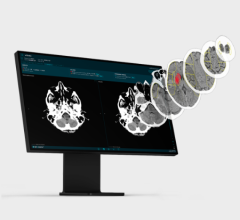
The American College of Radiology (ACR) Pediatric Artificial Intelligence (AI) workgroup has published a white paper to educate the radiology community about health equity issues related to pediatric AI. “Use of Artificial Intelligence in Radiology: Impact on Pediatric Patients,” published in the Journal of the American College of Radiology, JACR, is intended to improve the understanding of relevant pediatric AI issues and offer solutions that address inadequacies in pediatric AI development.
August 23, 2023 — With the goal of ensuring access to safe and clinically useful AI for all pediatric patients, the American College of Radiology (ACR) Pediatric Artificial Intelligence (AI) workgroup recently published a white paper to educate the radiology community about health equity issues related to pediatric AI.
“Use of Artificial Intelligence in Radiology: Impact on Pediatric Patients," published in the Journal of the American College of Radiology, JACR, on July 25, is intended to improve the understanding of relevant pediatric AI issues and offer solutions that address inadequacies in pediatric AI development.
According to an ACR online summary about the paper, the workgroup suggests addressing this current unmet need in several ways:
• Assess existing adult AI algorithms in pediatric cohorts prior to potential use in children.
• Incentivize vendors to develop AI using suitable pediatric data, either in separate pediatric models or in combined adult and pediatric datasets.
• Encourage transparency in regulatory bodies regarding the inclusion of pediatric patients in AI datasets to ensure correct application of AI based on customary metrics in pediatric care (e.g., age).
The paper stresses the importance of ensuring AI is safe, reliable and effective for children. As reported in the Abstract, the paper reinforces the role of the ACR Pediatric AI Workgroup of the Commission on Informatics, which: educates the radiology community about the health equity issue of the lack of pediatric artificial intelligence (AI); improves the understanding of relevant pediatric AI issues; and offers solutions to address the inadequacies in pediatric AI development. The authors further note that the design, training, validation, and safe implementation of AI in children require careful and specific approaches that can be distinct from those used for adults. They further comment: On the eve of widespread use of AI in imaging practice, the group invites the radiology community to align and join Image IntelliGently to ensure that the use of AI is safe, reliable, and effective for children.
In an overview of “Pediatric Radiology and AI Resources to Support Your Practice,” ACR offered this summary of the need for focused attention on pediatric patient care, noting:
Pediatric patient needs are not being sufficiently considered when AI is developed, tested or deployed, and applications may be ineffective or detrimental to pediatric patients.Specifically, to date, none of commercially available medical imaging AI tools that diagnose, triage, or detect abnormalities were designed to be used in pediatric patients, and only a handful of tools for image processing or quantification have been developed to be used in pediatric patients. For this reason a Pediatric AI Working Group in the ACR Informatics Commission has been established and is sponsoring the Image IntelliGently campaign to ensure equal access to high-quality and safe AI for pediatric patients.
Image IntelliGently, according to the ACR online overview of the collaborative program, is described as being composed of a wide variety of stakeholders, including private practices, academic settings and individuals with close ties to other relevant societies including AAP, HIMSS, SIIM and SPR, and a variety of expertise in educational, clinical and research domains. The summary adds that the group is charged, through stakeholder consensus, with providing guidance to ensure that all pediatric patients will have equitable access to clinically meaningful AI as it becomes increasingly available for use in adults. Its stated mission is “to ensure access to safe and clinically useful AI for all pediatric patients.”
The workgroup, within the ACR Informatics Commission, is sponsoring the Image IntelliGently campaign to raise awareness of the need for improved pediatric AI implementation and governance. The group is charged, through stakeholder consensus, with providing guidance to ensure that all pediatric patients will have equitable access to clinically meaningful AI as it becomes increasingly available for use in adults.
The physiology, anatomy and diagnoses of pediatric patients vary widely from their adult counterparts, yet only three percent of the >200 AI Software as a Medical Device (SaMD) cleared by the U.S. Food and Drug Administration (FDA) listed in ACR’s online catalog, ACR Data Science Institute AI Central, indicate they are intended for pediatric use.
Authors of the white paper include:
Marla B. K. Sammer, MD, MHA, Singleton Department of Radiology, Texas Children’s Hospital, Houston, Texas; Department of Radiology, Baylor College of Medicine, Houston, Texas; and Chair, Pediatric AI Workgroup, Commission on Informatics, American College of Radiology
Yasmin S. Akbari, MD, Radia, Inc., Lynnwood, Washington
Richard A. Barth, MD, Department of Radiology, Lucile Packard Children’s Hospital, Stanford University, Palo Alto, California
Steven L. Blumer, MD, MBA, CPE, Chair, Pediatrics Panel of the American College of Radiology Data Science Institute; Associate Medical Director of Radiology Informatics, University of Pittsburgh Medical Center Health System, Pittsburgh, Pennsylvania; and Department of Radiology, University of Pittsburgh Medical Center, Children’s Hospital of Pittsburgh, Pittsburgh, Pennsylvania
Jonathan R. Dillman, MD, MSc, Associate Chief, Research, William S. Ball Chair of Radiology Research, and Medical Director, Imaging Research Center, Department of Radiology, Cincinnati Children’s Hospital Medical Center, Cincinnati, Ohio; and University of Cincinnati College of Medicine
Shannon G. Farmakis, MD, Department of Radiology, Mercy Children’s Hospital, St. Louis, Missouri; and West County Radiological Group, St. Louis, Missouri
Don Frush, MD, Professor, Dept. of Radiology, Duke University, Durham, North Carolina
Ami Gokli, MD, Division Chief of Pediatric Radiology, Staten Island University Hospital, Staten Island, New York; and Associate Program Director, Department of Radiology Residency Program, Donald and Barbara Zucker School of Medicine at Hofstra/Northwell, Uniondale, New York
Safwan Halabi, MD, Lurie Children’s Hospital, Chicago, Illinois
Ramesh Iyer, MD, University of Washington, Seattle Children’s Hospital, Seattle, Washington
Aparna Joshi, MD, Section of Pediatric Radiology, University of Michigan, Ann Arbor, Michigan
Jeannie K. Kwon, MD, University of Texas Southwestern Medical Center, Dallas, Texas; Chief Radiology Officer, Children’s Health System of Texas, Dallas, Texas; and Chair, Informatics Committee, Society for Pediatric Radiology
Hansel Otero, MD, University of Pennsylvania, Children’s Hospital of Philadelphia, Philadelphia, Pennsylvania
Andrew C. Sher, MD, Singleton Department of Radiology, Texas Children’s Hospital, Houston, Texas; and Department of Radiology, Baylor College of Medicine, Houston, Texas
Susan Sotardi, MD, University of Pennsylvania, Children’s Hospital of Philadelphia, Philadelphia, Pennsylvania
Benjamin H. Taragin, MD, Department of Pediatric Radiology, Samson Assuta Ashdod University Hospital, Ashdod, Israel; Children’s Hospital of Philadelphia, Philadelphia, Pennsylvania; and Medical School for International Health, Ben Gurion University, Be’er Sheva, Israel
Alexander J. Towbin, MD, Department of Radiology, Cincinnati Children’s Hospital, Cincinnati, Ohio; and Department of Radiology, University of Cincinnati College of Medicine, Cincinnati, Ohio
Christoph Wald, MD, PhD, MBA, Chair, Department of Radiology, Lahey Hospital & Medical Center, Burlington, Massachusetts; Tufts University Medical School, Boston, Massachusetts; and Chair, Commission on Informatics
For more information, contact the ACR Data Science Institute: www.acrdsi.org.
Reference: DOI: https://doi.org/10.1016/j.jacr.2023.06.003


 February 05, 2026
February 05, 2026 









